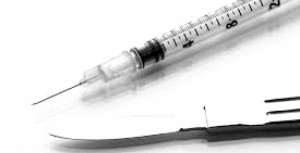FDA warns against potentially fatal silicone injections
27th November 2017 · 0 Comments
By Fritz Esker
Contributing Writer
The U.S. Food and Drug Administration (FDA) released a statement on November 14 warning Americans against the use of injectable fillers for body contouring in non-medical settings.
Injectable dermal fillers are regulated by the FDA. Some are approved for use in the face to enhance the appearance of lips or cheeks, but no injectable filler has yet been FDA-approved for large-scale body contouring or enhancement (i.e. breast and butt injections).
Jacqueline Francis, M.D. and medical officer for the FDA, said the agency has been receiving reports of the illegal injections for approximately five years. She said people do it for a variety of reasons, from making breasts or buttocks larger to bodybuilders smoothing their muscle tone for competitions.
“There are cases of it around the country,” said Francis. “People are doing it in homes or hotel rooms who are not licensed medical professionals.”
Marilyn Pelias, M.D. of Dr. Marilyn Pelias Cosmetic Surgery in Uptown New Orleans said she has seen several cases this year where patients have come to her looking to correct complications from unlicensed injections.
“It has always existed, but it has become more prevalent in the past two to three years,” Pelias said.
These injections can turn fatal. In a place like the buttocks where there are lots of blood vessels, the silicone can easily enter a blood vessel, which can migrate from the buttocks to the lungs or the brain. If it does so, it can cut off blood supply and lead to embolisms or strokes.
Francis said silicone that travels to the brain will almost certainly result in death. In the lungs, it can result in difficulty breathing, which can also escalate to fatal complications. Other issues, such as granulomas (inflamma-tion/swelling), can occur throughout the body. Some patients are permanently disfigured.
“The person who is doing the injection is often not trained at all, and the materials they are using are not even sterile,” Pelias said.
Pelias has seen patients with an entire body part (i.e. breast, butt) that turned rock hard because of the injection.
There have been fatalities in Louisiana. On October 9, of this year, The Daily Advertiser reported that Louisiana resident Vincent Boles was arrested for negligent homicide and practicing medicine without a license in the death of Brionna Guillory. Boles injected the 23-year-old woman with silicone in a Lafayette hotel. She died a short time later.
On July 3 of this year, Nola.com reported that Armani Davenport of Baton Rouge was scheduled to stand trial later that month on negligent homicide charges. The charges stemmed from a 2013 incident where Davenport injected silicone into the buttocks and hips of 25-year-old Brenisha Hall at a house on Salcedo Street. Hall would later experience difficulty breathing, lapse into a coma, and die on January 1, 2014.
In a press release, the FDA stated that it is unaware of the true extent of the problem because unlicensed practitioners do not report injuries incurred from illegal activity and patients may not realize why they’ve become ill.
While the complications can come shortly after injections, they can also happen years after the injection. Francis heard of a patient who had a granuloma 40 years after an injection. Once silicone enters your body, it never leaves.
Francis said it’s important for anyone who has received silicone injections to tell doctors about it if they experience any health problems. Some have shortness of breath, but don’t mention the injection either out of embarrassment or a belief that the silicone couldn’t be causing their current issues.
If anyone who has received a silicone injection experiences difficulty breathing, chest pain or signs of a stroke like difficulty speaking, numbness or weakness, difficulty walking, face drooping, severe headache, dizziness or confusion, they should seek medical attention immediately.
Consumers interested in body contouring should speak to a health care provider about appropriate procedures. The FDA published a “Check Before You Inject” flier to further educate consumers on the issue (fda.gov/downloads/Me-dicalDevices/ProductsandMedicalProcedures/CosmeticDevices/Wrinkle Fillers/UCM584838.pdf).
If you know of anyone administering illegal injections, the FDA encourages you to report it on their website at https://www.accessdata.fda.gov/scripts/email/oc/oci/contact.cfm.
This article originally published in the November 27, 2017 print edition of The Louisiana Weekly newspaper.



